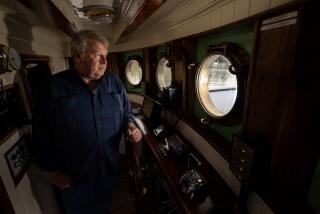Saying Goodbye to a Friend on a ‘Wild Sheet of Water’
- Share via
ROCKWOOD, Maine — There are tiny whitecaps on Moosehead Lake as I cross a broad bay in a catamaran. This boat would be invisible from atop the nearby mountains, for these waters, trimmed with evergreens, sprawl 40 miles from end to end.
I see an eagle, a heron, and in a bog, a moose foraging with her wobbly calf. They gaze back unafraid. There are no houses here, no roads, and ours is the only boat. It is as untamed as when Thoreau came through 140 years ago.
I’ve had a perfectly wonderful day, there’s no doubt about it. But I’m thinking of something perfectly awful, and there’s no way around it: Three people drowned here one fine autumn day, and one of them was my friend Ed. They were all wearing life jackets, they were sober. But their canoe capsized in rough waters. Within 30 minutes, the cold water killed them.
A half-hour before dying. It’s too horrible to contemplate, but I can’t stop: Were they conscious, suffering? Did they try to right their vessel, swim to land? Did they call for help, comfort each other? We’ll never know. Their bodies were found the next day.
How could this happen in a place where I’ve found nothing but happy memories? And how could it happen to Ed, the most methodical man in America, as prepared as an Eagle Scout for every disaster, as in love with nature as Thoreau himself?
I’d come to Moosehead as I do each year--as a day-tripper, on a family outing, to enjoy the scenery in one of the Northeast’s last wild places.
But this time, I had also come to say goodbye.
*
Ed Hogan and I were among a half-dozen people who lived together in the early 1980s on Robinson Street in Somerville, Mass., in a rambling old house with a bay window, pocket doors and a broad wooden staircase. We were all in our 20s, sharing food and chores, parties and politics, working low-paid jobs and finishing degrees. The Massachusetts Miracle was under way, a guy named Wang was making a fortune selling mainframe computers, and Gov. Mike Dukakis seemed to have a bright future.
Ed--organized, avuncular, genial--made the conflicts of group living bearable. He divvied up the bills, wrote the shopping lists, and made a schedule for housework. Reared in Somerville, Ed was the only local boy among us, and the night before our loud parties, he’d go door to door apologizing for the tumult to come. After all, we were hippies on a blue-collar block, and Ed didn’t want to offend the neighbors.
Ed was passionate about many things, among them travel, trains and bikes, literature and the great outdoors. He shared his interests with everyone he met, and I was no exception. We went hiking in the White Mountains in New Hampshire one rainy fall weekend; we heard Allen Ginsberg recite poetry in a Harvard Square cafe. And one summer when we were both in London, he persuaded me to rent a bike and sightsee with him in the smog and crazy traffic.
Ed made his living as a typesetter, then as a paralegal, and finally as a clerical worker at Harvard. But his real love was a small literary enterprise he’d founded called Zephyr Press, named for the New York-San Francisco route on Amtrak. In its early years, Zephyr published poetry, fiction, even a recipe book. But in 1990, Ed scored a coup: Zephyr published an English translation of the complete works of the great Russian poet Anna Akhmatova.
Suddenly Zephyr was on the literary map, with excellent reviews and orders from all over. Gradually, Ed developed a passion for all things Russian. He visited Ukraine, published travel guides to Eastern Europe and works in English by new Russian authors, and befriended many an emigre.
Among Ed’s new acquaintances was Yelena Lisovich, a single mother with a 9-year-old son, Konstantin. They accompanied him to Moosehead that day. He was sure they’d like canoeing as much as he did.
*
It was 1857 when Henry David Thoreau traveled by train from Massachusetts to Bangor, Maine, and then by stagecoach to the town of Greenville on Moosehead Lake. Thoreau called the lake a “wild-looking sheet of water” and hired a Penobscot Indian guide to help him cross it in a “little eggshell” of a boat, an 18-foot-long birch canoe.
The trip was not easy. Stiff winds and rough waters nearly capsized the rocking birch several times. Thoreau said he’d never have made it without his guide’s paddling skill.
“Before you think of it,” he later wrote in “The Maine Woods,” “a wave will gently creep up the side of the canoe and fill your lap, like a monster deliberately covering you with its slime before it swallows you.”
*
It was Oct. 3, 1997, when Ed Hogan drove from Somerville, Mass., to Rockwood, Maine, on Moosehead’s western shore. He was accompanied by Yelena and her son. They loaded their 15-foot-long Fiberglas canoe with a cooler full of food, camping gear, and the boy’s toy bunny, then headed to a cove 10 miles away. They intended to camp there overnight and paddle elsewhere Saturday for a hike and another night of camping.
But 24 hours later and two miles from their starting point, the child’s body was found, then Yelena’s, then Ed’s. Camping gear and the cooler washed up on an island. So did the stuffed bunny.
Authorities later said the boat was overloaded. Winds were running 10 knots, and the waves were 3 to 4 feet high--big enough to swamp a small, tippy boat. The water temperature, less than 55 degrees, was cold enough to cause death by hypothermia within a half-hour.
Ed was famous for his travelogues in e-mails and Christmas letters; I wonder what his narrative of this trip would have said had he lived to write it.
“It is impossible to get into a canoe again when it is upset,” Thoreau wrote in his account. “Nothing can save you, unless you can swim ashore.”
*
In a newspaper story about Ed’s death, I read that he’d made a list of things to bring to Moosehead the night before his trip. And I remembered that one night long ago, I’d watched Ed make a list of things to take to Europe. When he told me he lacked an emergency needle and thread, I offered a tiny sewing kit from my purse. On the day he returned, he gave it back, the needle just as neatly tucked into the cardboard of colored threads as when he’d borrowed it.
And that is why it’s so absurd that Ed is gone. Ed, who always wore his seat belt. Ed, who never drank. Ed, who packed rain gear on a sunny day. Ed, who researched every trip so well you could fall asleep listening to the details. Ed, who borrowed a sewing kit that cost 99 cents, carried it 10,000 miles, and returned it intact the day he came back. Ed couldn’t die in a lake; he was wearing a life jacket. Ed couldn’t die of the cold; it was only October. Ed couldn’t die in an accident; he was too careful.
How I wish I’d told Ed about a ride I took one sunny August day aboard the Katahdin, a steamer that used to haul log booms across Moosehead but now takes tourists on cruises. I wish Ed had seen the photo of me bundled up against the wind in a hooded jacket and blanket, like an immigrant crossing the Atlantic. I wish I’d told him how, after three hours on that boat, I could count on two hands the other boats I’d seen.
You can’t know it’s a bad idea to board a jet that ends up crashing, and you can’t know it’s a bad idea to live in a building that ends up burning. But a summer breeze once pinned me in a canoe at the edge of a lonely Maine pond just a half-mile wide, and I have long known it’s a bad idea to canoe a lake like Moosehead, unless you are as skilled as Thoreau’s guide.
I wish I’d called Ed the day my second son was born to tell him the good news; he went to Moosehead three days later, and if I’d told him not to go, I know he would have listened.
When I lived on Robinson Street 18 years ago, we had a tiny black-and-white kitten and a roommate who worked as a waiter. I kept the kitten and married the waiter. Both the cat and my marriage outlasted Ed. “The Maine Woods” was published 16 years after Thoreau’s death, but there will be no posthumous Christmas letters from Ed. He’s frozen in time at 46, hardly a gray hair on his head.
*
On the way home from my annual trip to Moosehead Lake, I get out of the car to stare at the night. There are no electric lights here, and I have never seen a sky so black, so velvet, or stars so bright. The heavens are not just above my head; they are swirling like a planetarium’s moving walls. I see the Dippers and Orion’s Belt; Venus glows green and the Milky Way flows white. “Look!” I cry out, dizzy, as a star falls zigzag, from on high. I am certain it is coming toward me, and I am certain I could find it, if only I were brave enough to enter those dark woods.
More to Read
Sign up for The Wild
We’ll help you find the best places to hike, bike and run, as well as the perfect silent spots for meditation and yoga.
You may occasionally receive promotional content from the Los Angeles Times.






